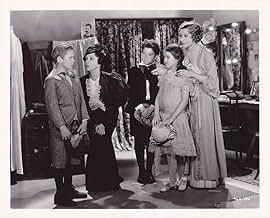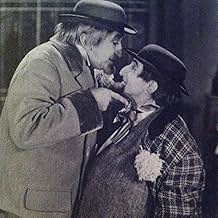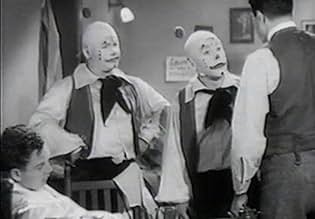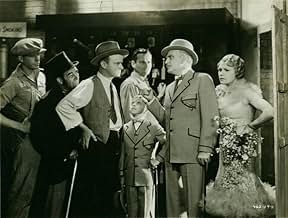A vaudeville couple quit to raise a son, then come back with their grandson in the act.A vaudeville couple quit to raise a son, then come back with their grandson in the act.A vaudeville couple quit to raise a son, then come back with their grandson in the act.
- Directors
- Writers
- Stars
- Awards
- 3 wins total
- Dancing Ensemble - Edited from The March of Time (1930)
- (archive footage)
- (as Albertina Rasch Dancers)
- Cousin David
- (uncredited)
- Man in Balcony
- (uncredited)
- Joe Mannion
- (uncredited)
- Wanda
- (uncredited)
- William Collier Sr. - Vaudeville Act
- (archive footage)
- (uncredited)
- Self
- (archive footage)
- (uncredited)
- Aunt Clara
- (uncredited)
- Directors
- Writers
- All cast & crew
- Production, box office & more at IMDbPro
Featured reviews
I have a few final comments that I hope provoke your interest and might make the film, despite its limitations, worth watching. It's interesting that Jackie Cooper received third billing in this film--although he's in the film only about five minutes or so! This is undoubtedly because, at the time, he was a HUGE star at MGM, but I am sure his fans were disappointed in seeing so little of him in the movie. Also, right after Junior's wife dies, watch for a scene with two bizarre clowns. It's practically impossible to tell because of all the makeup, but these are Curly and Moe Howard of the Three Stooges! This is because the Stooges originally signed with MGM but the studio had no idea what to do with them--and stuck them in some very strange films (including some very odd roles in "Dancing Lady"). Finally, watch the very young Mickey Rooney tap dancing (in the scene right after the Stooges). He is simply amazing to watch--especially because this performing dynamo was so young! Wow--what talent.
I like the premise of a multi-generational performing family. It promises to follow the family thru the entertainment business during some great changes. This has some interesting actors including a couple of famous child stars like pre-teen Mickey Rooney. The execution leaves something to be desired. It's a bit disjointed as the story keeps jumping forward in time. The idea is there, but it's not really fulfilled. I want Ted to stay with his younger generations and become their manager. There is plenty of potential conflicts as an overbearing stage father. Separating the family and the disjointedness of time jumping leave me a bit cold.
The first tale is why this film was made in the first place. In late 1930 MGM producer Harry Rapf was making a sequel to the Hollywood Revue of 1929. Unfortunately, musicals went out of fashion before the movie was finished and MGM had to shelve the project. Thus MGM was saddled with some very expensive musical footage and no movie. This film was an attempt to try to fit a story around some of that footage and recoup some of the losses. That is why you'll find long and often elaborate production numbers that don't really fit the plot placed awkwardly at points along the movie.
The second tale of interest is how this movie was considered by Buster Keaton to be "the final insult" hurled at him by MGM after they unceremoniously fired him this same year - 1933. He thought that the story of the third generation of Hacketts - Ted Hackett III - looked just a little too autobiographical to be a coincidence. Ted the 3rd is the member of a famed vaudeville family who gets recruited to go into motion pictures. Once he gets to Hollywood he begins to drink heavily - a vice that his father also had - and his drinking causes him to be late to the movie set if he even bothers to show up at all. Buster was furious about this movie, and nobody could convince him his own problems with MGM were not at the foundation of the plot and that it was simply an attempt to salvage "The March of Time" alias The Hollywood Revue of 1930.
Take these points of interest away from the film and there really is not much to see here other than Morgan and Brady's excellent performance as the senior generation of Hacketts who see "the march of time" from the height of vaudeville's popularity through the arrival of talking pictures which renders their profession obsolete.
Amazingly enough, in a movie set in vaudeville, none of the lead actors can dance. They're either filmed from very far away with obvious dance doubles, or in tight closeups that show them moving only their shoulders with huge grins. The exceptions are the kids, Jackie Cooper and Mickey Rooney, who ironically plays Jackie's son. You have to wait an hour to see him, and once again, he's only on the screen for a few minutes. This is a generational saga, with Frank and Alice aging decades in the ninety minutes. They start off as a young couple, then wind up with a grown-up grandson in their midst. If you're renting this movie to see the kiddies, you'll be disappointed. You'd better be watching it for Frank and Alice, who age very gracefully. With their white hair, Alice's dowager hump, and Frank's dark circles that show the hard life they've lived, it really feels as if you've known them their entire lives.
In the start of the movie, their gag at the end of their song and dance is for Alice to pick up a bouquet of roses thrown on the stage. Frank says to the audience, "I'll find the fellow who sent her those and break his neck!" to a strong laugh. As the decades pass, the laughter dwindles, and even though Frank's tone gives the same delivery, his eyes show he's humiliated and disappointed that he's never achieved more. Finally, as an old man, he uses a monocle, has a slack jaw, and wobbles his legs when he rises from his chair, all while preserving the dignity of a man who used to entertain audiences with his legs and the ladies with his good looks. If you're a Frank Morgan fan, rent it; he truly embodies the old hoofer who's tried and failed his whole life. If you're not, you probably won't enjoy it.
The problem for a contemporary viewer is that the people in cameos and the names that are dropped are probably unknown to the MTV generation. You would have to know that Joe Weber and Lew Fields for instance were a great vaudeville comedy team who then went into the producing end of the business in order to appreciate a scene where Joe Weber wants to hire young Ted Hackett II, and will give the elder Hacketts small bits in his show in order to get him.
Because it is revived every year around the 4th of July, I suppose Yankee Doodle Dandy is the best comparison to this film to make. The elder Cohans there are a show business family whose kids are raised in the theater atmosphere the way the Hacketts raise their son. Of course here we go into a third generation of Hacketts.
Doing a small unbilled part in this film is Nelson Eddy who sings In the Garden of My Heart during a show. Ironically in two years Eddy would be starring in Naughty Marietta and Frank Morgan would be supporting him.
In reading the credits I was flabbergasted to read that the brothers Howard of the 3 Stooges played a pair of clowns who essentially roll a drunken Ted Hackett Jr. as he's being fired from a show. Certainly Moe and Curly who started in vaudeville would know all about that venue of show business. They are unrecognizable in their clown make up.
When the film is nearing it's conclusion it's now Ted Hackett III who is hitting the big time in Hollywood played by Eddie Quillan. His parents were played by Russell Hardie and Madge Evans. Still it's Morgan and Brady who carry this. It's like if Walter Huston and Rosemary DeCamp were the central characters of Yankee Doodle Dandy.
It's a nice film with a good story, but I fear it's too dated for today's audience.
Did you know
- TriviaNelson Eddy - 33 at the time - was required to do a screen test for the film). Eddy's test took 58 takes and even the best was determined to be awful. MGM studio head Louis B. Mayer overruled everyone and ordered that he be only used for a singing sequence in the film.
- Quotes
Lulu Hackett: Actors haven't any more rights than other people. Anyway, I ain't crazy over actors.
Ted Hackett: Aww, don't say that, mama. It's a grand old profession.
Lulu Hackett: Yeah, I don't know about that. We're like monkeys climbing up and hanging by our tails, and the people outside the cages laugh and think it's funny. Yeah. Well, that's all right, so long as we don't quit amusing them.
Ted Hackett: Yeah, but we never quit. That's something performers don't do. They go on and on. They die, mother, but they don't quit.
- Crazy creditsIntro: "New York in the late 80's. Its great variety hall and most popular place of entertainment - - Tony Pastor's Theatre - where the greatest celebrities known to the amusement world started their careers. Upon its historical old stage this story begins."
- ConnectionsEdited from The March of Time (1930)
- How long is Broadway to Hollywood?Powered by Alexa
Details
- Release date
- Country of origin
- Language
- Also known as
- March of Time
- Filming locations
- Production company
- See more company credits at IMDbPro
- Runtime1 hour 25 minutes
- Color
- Aspect ratio
- 1.37 : 1
Contribute to this page



































